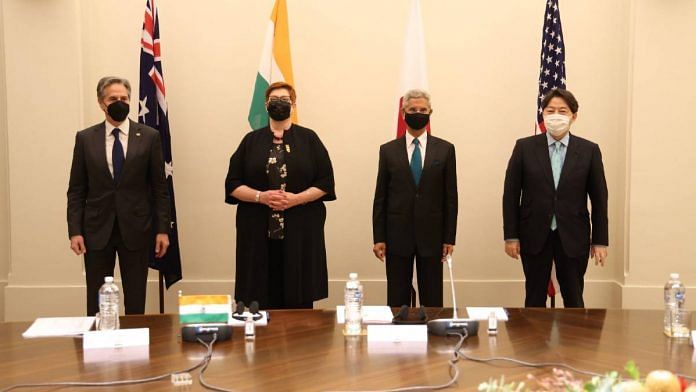At the Tokyo summit in May, Quad—formally the Quadrilateral Security Dialogue—leaders launched a maritime initiative to combat illegal fishing and pledged to invest $50 billion in infrastructure in the Indo-Pacific to counter China’s growing power. The Quad is a unique multi-country initiative that hopes to become a counterweight to China’s assertive, and often aggressive, actions in the region. While its primary focus is defence, it has the potential to add layers of economic initiatives that could transform not just regional but global trade.
Quad was set up as a loose alliance after the 2004 tsunami, with India, the US, Japan and Australia coming together for humanitarian assistance. Three years later, it was formalised but then went into suspended animation for a decade.
In 2017, as China took an increasingly belligerent stance and its influence grew, Quad was resurrected. While Donald Trump and Joe Biden couldn’t be more different, both US Presidents believed that Quad could be the answer to China’s growing might. Accordingly, the first formal Quad summit was held in 2021.
Also Read: With Russia-China bombers, Quad has to be all for one and one for all. Nothing less will do
Quad’s expansion
As the thinking around it evolves, Quad is looking to expand into other areas such as technology, trade, the environment and response to future pandemics. This is a welcome move and the logical extension of the partnership, never mind China’s grumbling that it represents an “Asian NATO”. There is no NATO-like mutual-defence pact, but military ties are very much part of the equation, as is evident from the March 2021 declaration: “We bring diverse perspectives and are united in a shared vision for the free and open Indo-Pacific. We strive for a region that is free, open, inclusive, healthy, anchored by democratic values, and unconstrained by coercion.”
The summit in May was the first in-person gathering of the group, especially important for the new incumbents in office—Japanese Prime Minister Fumio Kishida, who took office in October 2021, and Australia’s Prime Minister Anthony Albanese, who was sworn in just one day before the summit.
Indian Prime Minister Narendra Modi would have had issues like energy security on his mind, especially due to the turmoil caused by the Russian invasion of Ukraine. The invasion has also led to food shortages and soaring inflation, which forced India to ban wheat exports.
Again, stronger four-way trade ties could be the answer he’s seeking.
Not surprisingly, other countries have expressed an interest in joining Quad. Already, ‘Quad-plus’ meetings have included South Korea, New Zealand and Vietnam, and it’s these nations that could be the first to be included when Quad expands. South Korea is particularly keen to get in quickly.
Also Read: Quad 4th meet a triumph, but India’s problem is delay, slack, and unused secret weapon
US-South Korea brotherhood
There is now a clear understanding that real security must include members’ economic needs. Biden has been at pains to assert that economic priorities can be addressed within Quad as part of bilateral or multilateral arrangements. The focus going forward will be on establishing overlapping multilateral relationships that operate in “meshwork”.
South Korean President Yoon Seok-youl gave Biden a tour of a Samsung semiconductor plant, explaining that for his country, security means more than just the military. “Mr President, today we’re living in the era of economic security, where economy is security and vice versa,” Yoon said. Again, the assertion was that defence and economic stability are intertwined.
President Yoon was drawing from the pain of the past 30 months, which saw the Covid-19 pandemic wreak havoc on economies and healthcare systems and the Russia-Ukraine conflict severely disrupting supply chains, from medicines to crude oil and agricultural staples.
Biden would have nodded along to Yoon because economic competitiveness is where the US faces the most potent challenge from China, which has wider trade ties with most Asian countries. And this includes members of Quad.
The Biden administration recognises that and it’s also why the US and 12 Asian countries announced the Indo-Pacific Economic Framework (IPEF), which creates a framework for the digital economy and regional supply chains. Other than Quad members Australia, India and Japan, the IPEF includes Brunei, Indonesia, Malaysia, New Zealand, the Philippines, Singapore, South Korea, Thailand and Vietnam.
While the IPEF falls short of being a full-blown trade deal and there is no security component to it, the IPEF does facilitate collaboration for trade and economic growth.
It’s very clear, then, that security is critical but not separate from the regional economy. The more Quad focuses on it, the more successful it will be in achieving defence security too.
Asha Jadeja is a Silicon Valley-based entrepreneur, venture capitalist, philanthropist and a ‘change agent’.
(Edited by Srinjoy Dey)



